Ponera coarctata (Latreille)
  Hypoponera key Hypoponera key  Type-species for the genus (Formica
coarctata, Latreille, 1802b: 65, illustrated, worker and queen;
Bondroit, 1918: 82, male).
Type location Luxembourg Type-species for the genus (Formica
coarctata, Latreille, 1802b: 65, illustrated, worker and queen;
Bondroit, 1918: 82, male).
Type location Luxembourg
Junior synonyms
contracta (Formica
contracta, Latreille,
1802c: 195, illustrated, worker & queen; synonymy by Roger, 1863b:
16) from Luxembourg
atlantis (Ponera
coarctata Latr., var. atlantis,
n. var., Santschi, 1921e:
166, illustrated, worker) from Tunisia - see below.
crassisquama (Ponera
coarctata Latr., var. crassisquama,
n. var., Emery,
1916a: illustrated, worker) from Italy - see http://www.antweb.org/specimenImages.do?code=casent0903904 listed on Antweb as a junior synonym of testacea.
lucida (Emery, 1898c: 130, worker) from Turkestan
- see http://www.antweb.org/specimenImages.do?code=casent0903905.
testacea (Emery, 1895b: 294 [62 in Bolton 1995],
worker & queen) from France - see http://www.antweb.org/specimenImages.do?code=casent0903904
where it is listed as a separate species.
unavailable names
colchica (Arnol'di, 1932b: 63, worker) from Caucasus
- no images on Antweb (June 2014).
taurica (Arnol'di, 1932b: 65, worker) from Russia
- no images on Antweb (June 2014).
(see Bolton, 1995)  . .
|
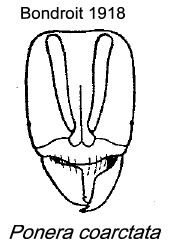 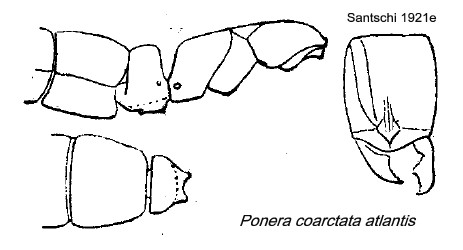 Latreille's
(1802c) description is at Latreille's
(1802c) description is at  . Lepeletier de
Saint-Fargeau (1835: 195) gave a fuller description of Ponera contracta, this is at . Lepeletier de
Saint-Fargeau (1835: 195) gave a fuller description of Ponera contracta, this is at  . Smith (1858b) provided an illustrated
description; this is at . Smith (1858b) provided an illustrated
description; this is at  . Roger (1860) also
provided a description; this is at . Roger (1860) also
provided a description; this is at  . Emery's (1916a) notes and description of crassisquama
is at . Emery's (1916a) notes and description of crassisquama
is at  . Bondroit (1918) provided an illustrated
description, with a note on testacea;
this is at . Bondroit (1918) provided an illustrated
description, with a note on testacea;
this is at  . Santschi's (1921e)
illustrated description of atlantis is at . Santschi's (1921e)
illustrated description of atlantis is at  . .
|
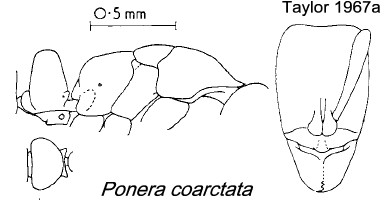 Taylor
(1967a: 21) provided an
illustrated modern description; this is at Taylor
(1967a: 21) provided an
illustrated modern description; this is at  . .
Note the dimensions given by Taylor for the queen appear to be wrong.
As published, the queen would be smaller than the worker which is not
the case (see the Lepeletier de
Saint-Fargeau, 1835: 195, dimensions).
|
WORKER
- TL in range 2.5-3.0 mm; head black or rust-red, matt; vertex convex;
antennal scape not reaching the vertex of the head; mandibles with 3
long anterior teeth, plus 12-15 shorter teeth; eye set well forward of
head mid-length, with 3-5 facets. In profile propodeum with declivity
and dorsum of similar length. Petiole scale thick, height less than
three times the width (after Bernard, 1952).
Wheeler (1922) gave the type collection details as
France - "Jardin de Luxembourg, prčs de Gentilly", Latreille. The
typical species distribution was Southern Europe (northward to Paris),
the Mediterranean subregion and Caucasus. Subspecies listed were boerorum
(from Natal and Tanzania), aemula (from Kibosho, Mt.
Kilimanjaro, Tanzania) and natalensis (from Natal); all workers
only.
Bolton (1995) has aemula as a variety of Hypoponera
dulcis; boerorum was raised to full species by Santschi
(1937), now Hypoponera boerorum; and natalensis as
raised to full species by Santschi (1938b), now Hypoponera
natalensis.
Bernard (1952) has it in his key to Ponera (most
now regarded as Hypoponera) from West Africa, and noted it as
cosmopolitan. As Bernard was familiar with the ants of the north
African area and had seen several of the major collections, one has to
accept that, without further evidence to the contrary, his
identification was correct and did not refer to one of the former
subspecies - all being from eastern or southern Africa.
|
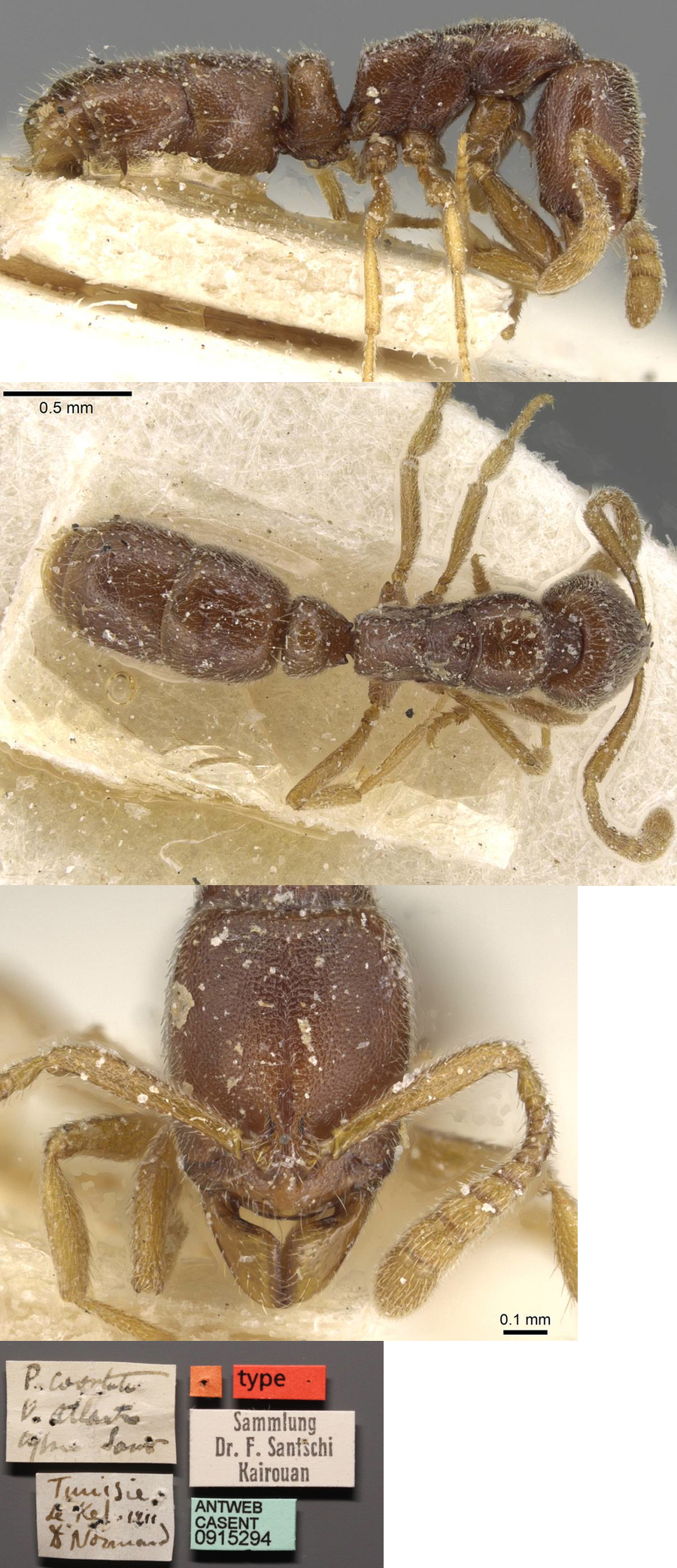 The
photomontage of the type worker of atlantis is collated from http://www.antweb.org/specimen.do?name=0915294. The
photomontage of the type worker of atlantis is collated from http://www.antweb.org/specimen.do?name=0915294.
|
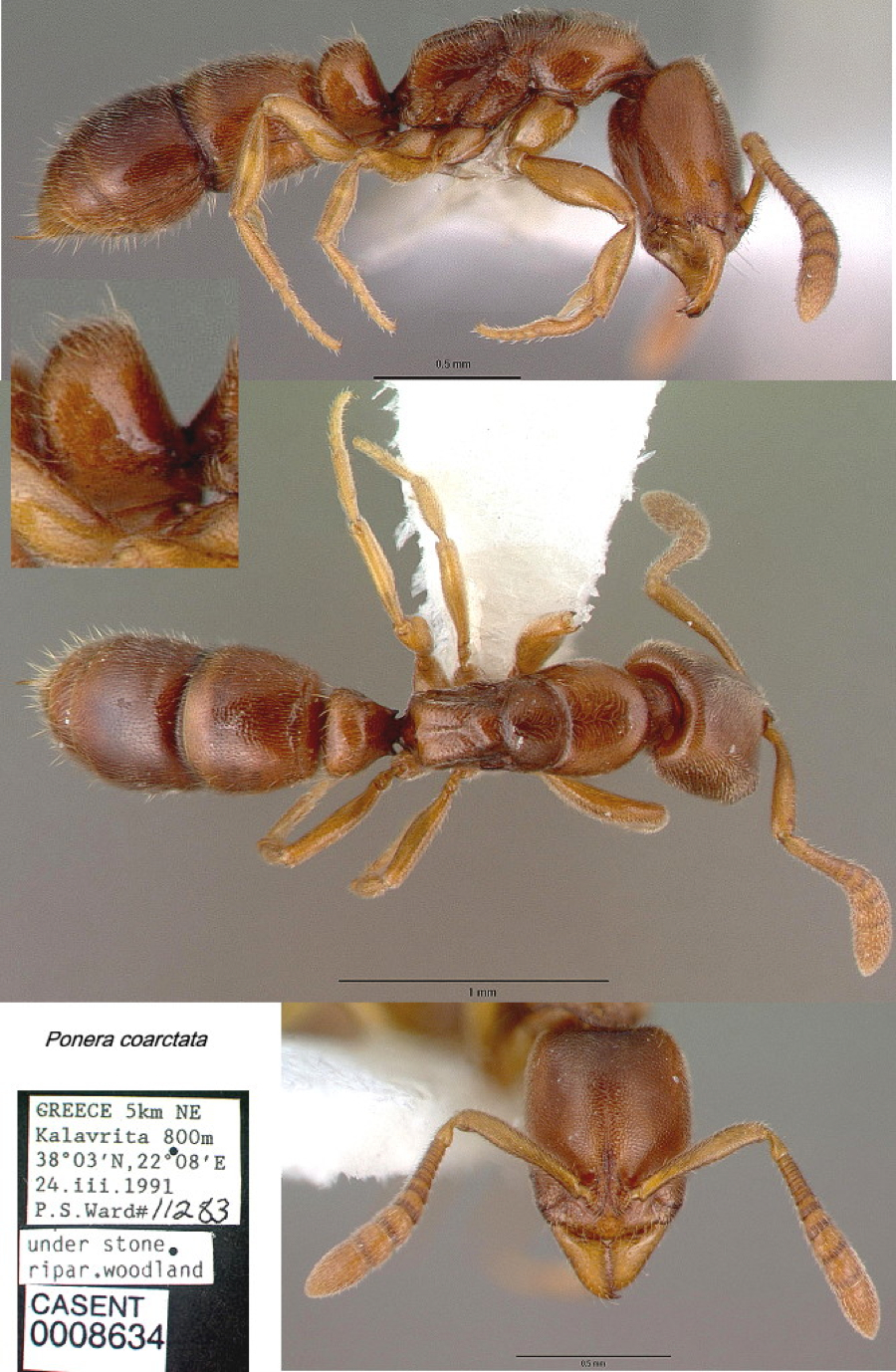 The
photomontage of a specimen from Greece is collated from http://www.antweb.org/specimen.do?name=CASENT0008634 The
photomontage of a specimen from Greece is collated from http://www.antweb.org/specimen.do?name=CASENT0008634
Collection Information: Specimen Code CASENT0008634; Locality Greece:
5km NE Kalavrita; 38°03'00"N 022°08'00"E 800 m; Collection codes:
PSW11283; Date: 24 Mar 1991; Collected by: P.S.Ward; Method: under
stone; Habitat: riparian woodland
|
Specimens from Western Cape, South
Africa, Knysna env., Goukamma, S 34°02.7' E 22°50.2'; sea level;
from coastal forest; collector Peter Hlavác; 28.i.2004; that were
thought by me prviously to be P.
coarctata now appear the match the diagnosis of Hyoponera spei by Bolton &
Fisher (2011).
|
|